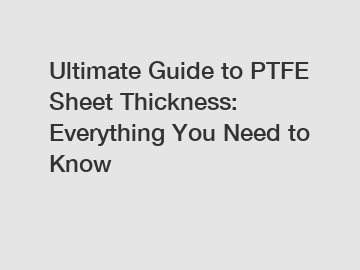Ultimate Guide to PTFE Sheet Thickness: Everything You Need to Know
DELONG contains other products and information you need, so please check it out.
When it comes to choosing the right PTFE sheet thickness for your project, there are a few key factors to consider. PTFE, or polytetrafluoroethylene, is a versatile material known for its low friction properties, high temperature resistance, and chemical inertness. PTFE sheets are commonly used in a wide range of industrial applications, from food processing to aerospace.
In this ultimate guide, we will cover everything you need to know about PTFE sheet thickness, including how to choose the right thickness for your specific application.

PTFE sheets are available in a variety of thicknesses, ranging from thin films to thicker sheets. The thickness of a PTFE sheet is typically measured in mils or microns, with 1 mil equal to 0.001 inch and 1 micron equal to 0.001 millimeter. The right thickness for your project will depend on several factors, including the intended use of the PTFE sheet, the level of mechanical stress it will be subjected to, and the desired level of chemical resistance.
For applications where the PTFE sheet will be subjected to high levels of mechanical stress, such as gaskets or seals, a thicker sheet is generally recommended. Thicker PTFE sheets are also more resistant to tearing and puncturing, making them ideal for applications where durability is key.
On the other hand, thin PTFE films are often used in applications where a high level of flexibility is required, such as in wire and cable insulation. Thin PTFE films are also ideal for applications where weight savings are a priority, as they are lightweight and easy to handle.
When choosing the right PTFE sheet thickness for your project, it's important to consider the material's chemical resistance properties. PTFE is known for its excellent chemical resistance, making it ideal for use in harsh chemical environments. However, the thickness of the PTFE sheet can impact its resistance to certain chemicals.
Thicker PTFE sheets offer better chemical resistance than thinner sheets, as they provide a greater barrier between the chemical and the underlying material. Thicker sheets are also less likely to break down or degrade when exposed to harsh chemicals, making them ideal for applications where chemical resistance is a priority.
In addition to mechanical stress and chemical resistance, the intended use of the PTFE sheet will also influence the choice of thickness. For applications where a high level of precision is required, such as in the manufacturing of medical devices or electronic components, thin PTFE films are often preferred. Thin films offer excellent dimensional stability and uniformity, making them ideal for applications where precision is key.
When it comes to choosing the right PTFE sheet thickness for your project, it's important to consider all of these factors to ensure that you select the best material for your specific application. Consulting with a knowledgeable supplier or manufacturer of PTFE sheets can also help you make an informed decision.
In conclusion, PTFE sheet thickness is an important factor to consider when selecting a material for your project. By taking into account the intended use of the PTFE sheet, the level of mechanical stress it will be subjected to, and the desired level of chemical resistance, you can choose the right thickness for your specific application. Whether you need a thin film for flexible applications or a thick sheet for high-stress environments, there is a PTFE sheet thickness that is right for you.
For more information, please visit clear ptfe sheet.
202
0
0

Comments
All Comments (0)